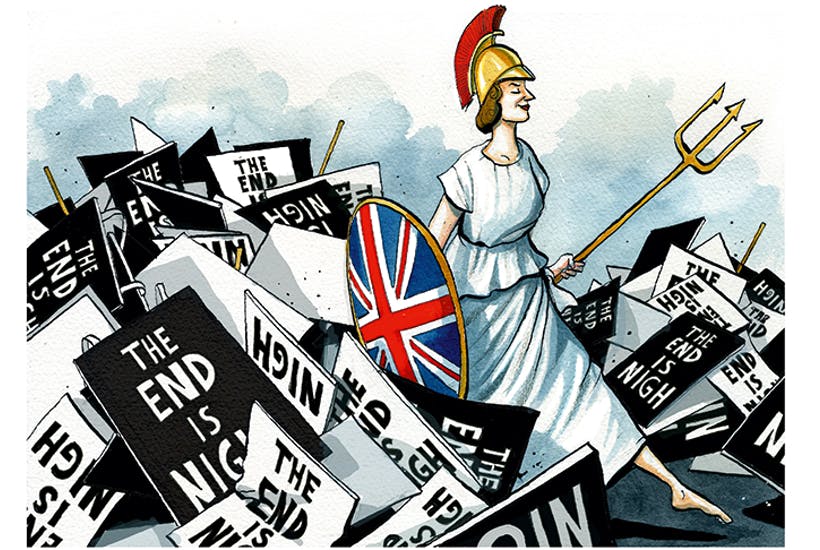‘Global Britain’: a phrase that provokes mockery and even indignation. As an alternative to EU membership many consider it impossible and worse, undesirable. Are we capable of true independence, or is this an illusion? Does ‘global Britain’, as its bitterest critics accuse, draw on imperial nostalgia and nationalistic arrogance? Or is it a rational response to a changing world?
It is certainly not a new response. Britain has been a global player since the 1730s. Since the early 1800s we have had to be: with a population of 14 million we were no longer able to feed ourselves, and Britain’s enemies looked forward to the day when it would starve. Sir Robert Peel abolished the protectionist Corn Laws to import the cheapest food available: ‘We might on moral and social grounds prefer cornfields to cotton factories, but our lot is cast.’
Ever since, our goods trade has been precariously in balance and increasingly in deficit — now overwhelmingly with the artificially expensive EU and its Corn Law equivalent. Despite Sir Robert’s assumption, it was not King Cotton that fed us. Even during the fairly brief period when we were the workshop of the world we did not always sell sufficient manufactures to purchase our imports; and indeed, British industry has rarely, taking a long view, been a world beater. That title goes to global services and the City. We have long had to earn our bread by our wits.
Those who believe that we can only trade effectively with the nearest markets — the ‘gravity model’ by which the Treasury justified Project Fear — know little history. Our most dynamic economic partners for more than 200 years have been in the Americas. Our biggest single export throughout the 19th century was cloth to India. Advances in steamships and refrigeration transformed Victorian living standards by bringing wheat, beef, lamb and butter from the United States, Argentina, Canada, Australia and New Zealand. Twentieth-century economic crises and wars made us even more global. Joining the Common Market diverted much of this trade temporarily to Europe, but since 2000 it has been shifting back towards what it was before we joined. The result? The Legatum Institute’s 2019 Global Prosperity Index (based on a range of economic, cultural and quality-of-life criteria) places us second in the world among larger countries, just after Germany. So why the pessimism?
Those who believe we can only trade effectively with the nearest markets know little history
Our future global role and standing will depend crucially on what we do at home. Some countries rely on raw power and fear. Russia has done so for three centuries. China may follow. The United States has been fortunate in combining power with a utopian vision. Britain has never been able to rely on power alone. It is a fundamental error to think of Britain as a shrunken superpower: we have never been more than a medium-sized state sometimes choosing — and often obliged — to ‘punch above its weight’. From the 18th century much of Britain’s influence came from offering a new vision of liberty, accountable government and broad prosperity (‘the English poor appear almost rich to the French poor,’ observed Alexis de Tocqueville). What vision should we offer now?
We have lost ground in the world’s eyes due to our recent self-humiliation. To reaffirm accountable democratic government, constitutional, legal and administrative reforms are urgent. As a start, the Fixed Term Parliaments Act must be repealed and the Supreme Court reformed or scrapped. Improvement in schools, professional training and universities must be pushed boldly: we cannot rest on the laurels of a few outstanding institutions. When Britain emerged through commercial and industrial revolutions into its modern age in the 18th century, it was among the best-educated societies in the world. We must become so again. And we need a coherent energy policy — an economic, ecological and strategic imperative.
If we can make ourselves a model national democracy in the eyes of the world, with clearly articulated values (do we know what they are?), the foundations of a global role will be firm. We possess huge advantages, starting with our language and history. The Henry Jackson Society’s 2019 Audit of Global Capability, based on the combination of economic, cultural, demographic and military strength, judged Britain to be second in the world after the USA. So we have a lot to work with, including our large aid budget. Its relative altruism — gifts not loans, and nothing expected in return — wins respect from other countries, though not emulation. Is this really the best way to run an aid policy — more or less as a charity? The welcome likelihood of merging DfID with the Foreign Office shows that some are having second thoughts.
But what should we do in the world? We could become what the Foreign Office feared in the 1960s — a ‘greater Sweden’. A prosperous democracy minding our own business, giving up our UN seat, scrapping our nuclear submarines and selling our new aircraft carriers. I doubt this is possible, because of our size and geography, and because of the global economic imperative I have sketched above: ‘Our lot is cast.’ How we act, as in the past, will partly be shaped by the actions of others, allies and enemies. Why should they give us a free ride? Why would they respect rights we were unwilling to defend?
Global dangers are formidable because unpredictable: climate change, China, Russia, demography, migration, the future of Africa, terrorism, international crime, cyber-attack, doubts about the USA. Yet in conventional terms, Britain is less threatened than at any time since at least the 1870s. We are less dependent on others than during the period of the two world wars and the Cold War. So we have some freedom to respond creatively to this troubling future. The foreign secretary Lord Palmerston told the Commons in 1848 that ‘England is a power sufficiently strong to steer her own course, and not to tie herself as an unnecessary appendage to the policy of any other government.’
Yet Palmerston was painfully aware of the predatory world in which he lived and of Britain’s vulnerability: he feared invasion by the French and would never have dreamt of defending the Baltic against Russia, as we are now doing. His maxim was: ‘We have no eternal allies, and we have no perpetual enemies. Our interests are eternal and perpetual, and those interests it is our duty to follow.’ Quoted out of context, this seems selfish realpolitik. In fact, he was expounding an ethical foreign policy based on peace wherever possible, force only when inescapable: ‘I hold that the real policy of England — apart from questions which involve her own particular interests, political or commercial — is to be the champion of justice and right; pursuing that course with moderation and prudence, not becoming the Quixote of the world, but giving the weight of her moral sanction and support’ — occasionally backed by gunboats. Not a bad prescription for a democratic and trading nation, if we have Palmerston’s courage. But do politicians even know — let alone explain — what and where our ‘eternal interests’ are? If they include global order, trade, democracy and sustainable development, can we rely on others to promote and protect them?
We have, fortunately, a huge advantage over Palmerston: we do have ‘eternal allies’, linked by profound similarities of culture and values. The closest are all English–speaking. But we might also add our awkward ally for two centuries, France, and our oldest Asian ally, Japan. The most important aim of ‘global Britain’ is to renew these ties, and make them effective through both hard and soft power. Aid to developing members of the club in Africa — not least in the form of university scholarships (at present officially regarded as elitist) — should be part of an explicit coordinated strategy.
China and India will remain, as for centuries past, both tempting and risky. It will be interesting to see what effect the unprecedented education of a significant part of the Chinese elite in the UK will have on our relations. Meanwhile, we should give our ‘moral sanction and support’ to moderates in India and democrats in Hong Kong — hopefully a beacon of future Chinese liberty.
In Palmerston’s time, defence spending was constantly under downward pressure, and panicky increases often came too late: a familiar and dangerous subtext to our national saga. Technological change — gunpowder, dreadnought battleships, radar — always adds to the flux by making existing forces obsolescent while giving sudden advantage to the technically and economically advanced. In the age of cyber warfare, hypersonic missiles, robots and ultra–precision weapons, this is an opportunity that we cannot afford to pass up because our potential antagonists will not. Incidentally, it makes the EU’s ambition to create a conventional army seem archaic.
To govern is to choose, said François Mitterrand. We have at last a government that can choose, and it must: history will not forgive failure now. Who can bring all these things together — economic, cultural, political, strategic — and set a course to replace the half-hearted Eurocentrism of the past half-century? We have not had a great global strategist since Churchill, and before him, Salisbury, and before him, Palmerston. They are few and far between. But we need one now with the brains, vision and courage to show us the way through the dangerous labyrinth the world has become.
Robert Tombs is emeritus professor of history at Cambridge University and the author of The English and Their History.







Comments